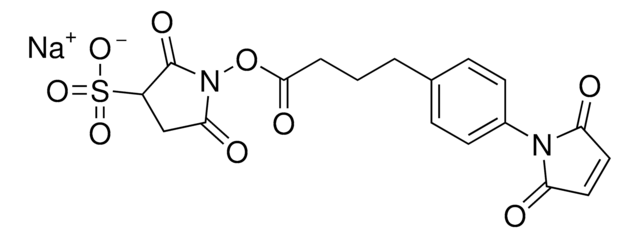M6035
4-(N-Maleimidomethyl)cyclohexane-1-carboxylic acid 3-sulfo-N-hydroxysuccinimide ester sodium salt
powder
Synonym(s):
Sulfo-SMCC
About This Item
Recommended Products
form
powder
Quality Level
reaction suitability
reagent type: linker
color
white to light brown
solubility
H2O: 2.5 mg/mL
DMF: soluble
application(s)
diagnostic assay manufacturing
hematology
histology
storage temp.
2-8°C
SMILES string
O=C(N1CC2CCC(C(ON3C(CC(S(=O)(O[Na])=O)C3=O)=O)=O)CC2)C=CC1=O
InChI
1S/C16H18N2O9S.Na/c19-12-5-6-13(20)17(12)8-9-1-3-10(4-2-9)16(23)27-18-14(21)7-11(15(18)22)28(24,25)26;/h5-6,9-11H,1-4,7-8H2,(H,24,25,26);/q;+1/p-1
InChI key
VUFNRPJNRFOTGK-UHFFFAOYSA-M
Looking for similar products? Visit Product Comparison Guide
General description
Biochem/physiol Actions
Quality
Storage Class Code
11 - Combustible Solids
WGK
WGK 3
Flash Point(F)
Not applicable
Flash Point(C)
Not applicable
Choose from one of the most recent versions:
Already Own This Product?
Find documentation for the products that you have recently purchased in the Document Library.
Customers Also Viewed
Articles
Collagen molecules play a critical role in tissue architecture and strength, and in cell-matrix interactions as insoluble ligands to regulate the diverse phenotypic activities of cells.
Collagen molecules play a critical role in tissue architecture and strength, and in cell-matrix interactions as insoluble ligands to regulate the diverse phenotypic activities of cells.
Collagen molecules play a critical role in tissue architecture and strength, and in cell-matrix interactions as insoluble ligands to regulate the diverse phenotypic activities of cells.
Collagen molecules play a critical role in tissue architecture and strength, and in cell-matrix interactions as insoluble ligands to regulate the diverse phenotypic activities of cells.
Our team of scientists has experience in all areas of research including Life Science, Material Science, Chemical Synthesis, Chromatography, Analytical and many others.
Contact Technical Service










![Sulfo-LC-SPDP (sulfosuccinimidyl 6-[3′-(2-pyridyldithio)propionamido]hexanoate)](/deepweb/assets/sigmaaldrich/product/structures/266/633/e2a263be-4bd3-4fcf-89c4-75b5e2bd829c/640/e2a263be-4bd3-4fcf-89c4-75b5e2bd829c.png)
